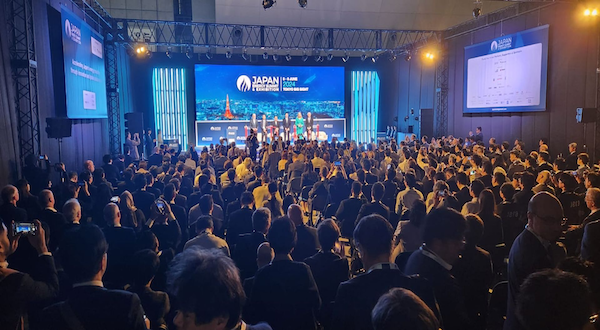
The Japan Energy Summit & Exhibition 2025 Executive Committee convened in Tokyo under the leadership of Nobuo Tanaka, Executive Director Emeritus, International Energy Agency (IEA), to define the event’s agenda and assess the challenges shaping Japan’s energy future.
As Japan navigates LNG supply uncertainties, decarbonisation targets, and evolving global energy partnerships, the Pre-Summit Industry Panel, attended by over 100 senior energy professionals, explored the implications of the country’s Seventh Strategic Energy Plan and the investment climate for energy transition projects.
The panel featured senior representatives from global energy, finance, and policy institutions, offering international perspectives on Japan’s energy transition:
- Nobuo Tanaka, Executive Director Emeritus, International Energy Agency (IEA)
- Ken Kuroda, Senior Advisor, Cheniere Marketing Ltd
- Bruno Gaussorgues, Group Country Head - Japan, Societe Generale
- Patricia Bader-Johnston, CEO, Silverbirch Associates KK
- Max Takahashi, Director, Managing and Executive Officer, Japan Marine Science Inc
Energy Security, LNG Supply, and Decarbonisation at the Forefront
With long-term LNG contracts nearing expiration, the panel underscored the urgency of securing new supply agreements amid shifting policies and geopolitical uncertainties. Ken Kuroda of Cheniere Marketing Ltd. addressed the challenges in increasing U.S. LNG exports to Japan, citing regulatory hurdles and cost constraints. "Long-term commitments are essential for securing stable LNG supply chains, but future demand uncertainty in Japan presents a challenge to buyers," he stated. "This is why the guidance of the new strategic energy plan is so critical."
Europe’s decarbonisation strategy emerged as a key reference point for Japan’s transition. Bruno Gaussorgues of Societe Generale highlighted Europe’s regulatory frameworks and financial incentives, which have played a crucial role in sustaining the clean energy transition.
"Europe has been transitioning for the past 20 years. It’s a sustainable model, and the regulatory adjustments we see today will not change the fundamental direction of the energy transition," Gaussorgues explained.
With Japan’s LNG demand projected to rise to 74 million tonnes, concerns over supply security dominated discussions. Kuroda noted:
"Japan’s LNG demand could reach 74 million tonnes versus 54-55 million tonnes in the base case scenario, creating a significant gap," reinforcing the urgency of long-term supply agreements.
Investment and Policy Stability: Key to Energy Transition
Decarbonisation remains a major investment driver, with industry leaders emphasising global best practices. Bruno Gaussorgues highlighted Europe’s success in offshore wind and carbon capture projects, where early-stage government incentives significantly reduced costs and accelerated deployment. "At the start, all these technologies are expensive. But with the right incentives, things can happen," Gaussorgues explained, citing offshore wind and carbon capture as examples of successful cost reduction.
Meanwhile, Patricia Bader-Johnston underscored the need for grassroots initiatives in Japan’s renewable energy transition, advocating for greater investment in community-led energy projects to complement large-scale infrastructure. "We’re seeing a move towards 40-50% renewables in Japan’s new strategy. But for that to succeed, we need more openness to small-scale, community-based projects," she noted, calling for policies that foster local innovation.
The panel concluded with a strong call for policy stability and regulatory clarity to attract long-term investments. "Without clear carbon pricing and long-term policy stability, private sector investment will remain hesitant," Bader-Johnston stated, urging government-backed incentives and a robust regulatory framework.
The Road to Japan Energy Summit & Exhibition 2025
These critical discussions will continue to shape Japan’s energy future, culminating at the Japan Energy Summit & Exhibition from 18-20 June 2025. The event will bring together global and domestic leaders, driving discussions on LNG security, investment, policy frameworks, and diversified partnerships to mitigate risk.
The Japan Energy Summit & Exhibition 2025 will be the definitive platform for high-level dialogue, investment opportunities, and policy direction, ensuring that the momentum from the Pre-Summit Industry Panel translates into actionable strategies in the months ahead.
Speaking on the significance of the event, Christopher Hudson, President of dmg events, organisers of Japan Energy Summit & Exhibition, stated:
"Japan is at a critical inflection point in its energy transition, requiring a balance between energy security, affordability, and sustainability. The summit provides a unique platform to facilitate discussions that will drive investment and policy direction. The insights shared by global energy leaders today reinforce the importance of international collaboration in securing a resilient and low-carbon energy future for Japan."
Please Contact Us at:
media@xindemarine.com





